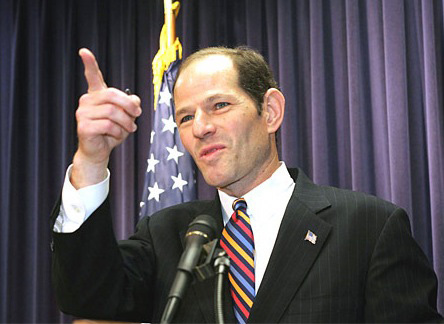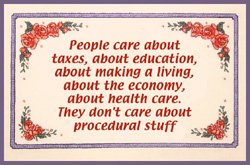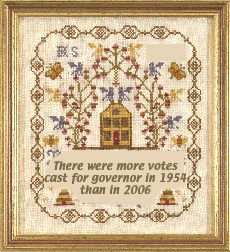Advising Spitzer

With Eliot Spitzer sworn in as governor on the first day of 2007, New Yorkers have an array of expectations and demands for the state's new chief executive. Some want to see their taxes go down, while others want better services in the state. And still others think that, with a state senator under indictment, the state comptroller forced to resign and the Senate majority leader under investigation, nothing is more important than cleaning up the mess in Albany.
For his part, Spitzer has vowed changes from Day One. But how can he negotiate his way through the competing demands and the labyrinth of state government?
Last month the New School's Milano School sponsored a conference on "Governing Change: Policy, Politics and the Spitzer Administration." The following comments from five people in the know, including two former governors, are excerpted from the discussion.
Make Our Lives Better
By Norman Adler
There are basic and substantial policy problems facing New York State. If I were an adviser to the governor, I would say, solve some of the issues that the people in the state care about.
When you ask people what they care about, they care about taxes, they care about education, they care about making a living, they care about the economy of the state, they care about health care. They don't care about the procedural stuff. When Spitzer goes back to run for re-election, the electorate is going to say, "What about taxes, what about health care, what about education, what about the budget, what about the economy?" If you haven't produced on those, the fact that you told people who work for government that they can't lobby for two years after they leave government, is going to be greeted with either a scoff or a yawn.
 Spitzer has a ruling from the State Court of Appeals that gives him a lot of freedom on the budget. The legislature can barely do anything about it except sit on its hands. He has an enormous victory from the electorate. He has a huge majority of Democrats in the Assembly and a bare majority of Republicans in the Senate. And I believe the Republicans are looking to work with him. So if Spitzer does not succeed in advancing some of these issues, he has really blown it and the electorate has a right to take it out on him the next time he runs.
Spitzer has a ruling from the State Court of Appeals that gives him a lot of freedom on the budget. The legislature can barely do anything about it except sit on its hands. He has an enormous victory from the electorate. He has a huge majority of Democrats in the Assembly and a bare majority of Republicans in the Senate. And I believe the Republicans are looking to work with him. So if Spitzer does not succeed in advancing some of these issues, he has really blown it and the electorate has a right to take it out on him the next time he runs.
Political money is like water in the basement. You can do every single one of these reforms: You can limit the amount of money you ask for, you can prevent lobbyists from holding fund-raisers in Albany, and all of that, but resources are going to flow in the next election because that's the way it is.
If the governor is going to expend his resources, he should expend them on something where he can go back and say to the whole state, "There, I did something for you, and your life will be better because of it." Campaign finance reform is not it.
Norman Adler is a political consultant.
Restore Democracy
By Gerald Benjamin
This is the 15 minutes of fame for reform in New York. Reform has been put on the agenda. And we have a change in the executive branch. We have a governor-elect who has committed himself, both through his behavior and through his policies, to fundamental reform of our government.
So we're at a special moment. The fundamental question is, what should we pay attention to and focus upon? Since everything has the word "reform" added to it, the population of possibilities, already very large, expands.
First: New Yorkers need a functioning democracy, and they do not have one. There were more votes cast - 20 percent more - for governor in 1954 than in 2006. The drop off is palpable from the last relatively competitive election to this one, so there is something going on. One thing we can do is restore confidence in the system. We need campaign finance reform, legislative redistricting reform, and election administration reform. Our failure to meet federal expectations on the Help America Vote Act has raised visibility of the fact that we have a grievously abysmal election administration system embedded in our state constitution.
Second: Return financial balance and probity to state government and to local government. We hear discussions on how to make borrowing easier in a state that has an extraordinary level of debt. Bring fiscal balance to the state, real balance, not year-to-year balance. Address the property tax. Make the budget outcome transparent and understandable to citizens
 Third: Improve our institutions and the relationship among our institutions. We have to attend more to the reform of the judiciary, which has been stymied despite the best efforts of the chief judge because it requires constitutional change. There are other opportunities for greater transparency, greater accountability
Third: Improve our institutions and the relationship among our institutions. We have to attend more to the reform of the judiciary, which has been stymied despite the best efforts of the chief judge because it requires constitutional change. There are other opportunities for greater transparency, greater accountability
And I think we have a fundamental stake in the revitalization of the Republican Party. If we do not have competitive politics, we cannot have accountable government. If we have the principal Republican institution in the state [the State Senate] dependent upon malapportionment, and our failure to reform campaign finance, Republicans will persist in relying upon systemic pathologies to sustain the only bit of power that they still retain.
The governor has some choices to make. If I were making the choices, some of the most popular reforms would not move forward because they are the least likely to be achieved. I would take reforms like merit selection of judges out front. I would take reforms like getting a decent technology to reform voting out front. If the courts are making us do those things, the governor should embrace the opportunity.
But in the longer term, our governor-elect needs a constitutional reform agenda. Every area I have mentioned implicates the New York State constitution and barriers to change in it.
Gerald Benjamin is dean of liberal arts and sciences at the State University of New York at New Paltz and an expert on state and local government.
Close The Loopholes
By Blair Horner
The governor has to deliver on the things he said he is going to deliver on. He said he is going to deliver on a property tax cut, he said he is going to fix Medicaid, he said he's going to deal with Campaign for Fiscal Equity ruling on school funding.
The list is long, and there are only so many things one governor can do. So if I were counseling the governor, I would urge him to focus on using his executive power and on the areas where opportunities will present themselves this year.
For example, the law that creates the legislative redistricting commission expires in June. That law has to be extended if the legislature wants to continue to have a commission that, as far as I can tell, does nothing for eight years and a lot for two. This is a perfect opportunity to raise the issue of how district lines are drawn. Can the governor win on that issue in one year? Not if you want a constitutional amendment. But you won't get a constitutional amendment unless you begin the process.
 The lobbying law expires next year. It is a perfect opportunity to raise the issue of lobbying and ethics. Next year is the 20th anniversary of the state's ethics law, which was not great when it was first passed and has withered away. The longer you have a reform, the more people think of how to get around it. New York's ethics law has more or less been frozen in time and space from 1987, and people have figured out how to game the system. So it's a good opportunity to go to that issue.
The lobbying law expires next year. It is a perfect opportunity to raise the issue of lobbying and ethics. Next year is the 20th anniversary of the state's ethics law, which was not great when it was first passed and has withered away. The longer you have a reform, the more people think of how to get around it. New York's ethics law has more or less been frozen in time and space from 1987, and people have figured out how to game the system. So it's a good opportunity to go to that issue.
In February, the consumer price index for campaign contributions kicks in. To people who work on social issues, the index is a nice thing [it increases benefits to keep pace with inflation] but in campaign contributions it can be a bad thing. The legal limit for campaign contributions to a political party in New York is $84,000 a year. That gets adjusted for inflation in early February and goes up to close to $100,000.
Is it right that the party campaign contribution limit is about to go over $100,000? Is it right for elected officials, who virtually never face opponents, to spend the money on themselves, for leasing luxury cars, for taking trips abroad? Is it right that no one enforces the pathetic law we have in New York?
People are not writing huge campaign contributions because they are giving to charity. They want something in return. And when they talk they speak with a megaphone and the rest of us speak with a whisper. That's not right.
Spitzer does have to deliver on the big-ticket items. But he has to have a reform victory that people understand relatively quickly because it will get harder as time goes on. He should press ahead on some of these issues and see what shakes out.
If Spitzer is able to achieve reasonable campaign contribution limits, as low as possible, close up some of the ridiculous loopholes in the law and actually get it to be enforced, that would be a substantial achievement.
Blair Horner is legislative director for New York Public Interest Research Group
Keep the Tax Pledge
By William Weld
When I ran for governor of Massachusetts, I proposed cutting a billion dollars out of the budget. [Outgoing Governor] Michael Dukakis said, "Billy Weld doesn't understand the state budget. He doesn't understand that we've already cut through the fat and through the muscle and severed the nerves and we're now down to bone, he's asking us to scrape bone marrow."
 But we found $2 billion out of a $14 billion budget in the first two months. I believe that there's no modern budget that doesn't have 10 percent in it that couldn't be cut. Government has a way of growing beyond what's absolutely necessary, so I would suggest to Governor-elect Spitzer that he solidify that no new taxes pledge, which he has come close to making, and stick by it. It creates the discipline you need.
But we found $2 billion out of a $14 billion budget in the first two months. I believe that there's no modern budget that doesn't have 10 percent in it that couldn't be cut. Government has a way of growing beyond what's absolutely necessary, so I would suggest to Governor-elect Spitzer that he solidify that no new taxes pledge, which he has come close to making, and stick by it. It creates the discipline you need.
There are creative things you can do. We are at a point, for example, where we can consider changing from a tax based system for transportation to a user based system that would take some pressure off the tax rolls and transfer it to the consumers of various services.
You've got to get 50 percent of your agenda accomplished in your first six to nine months or you're going to be a failure. The first year is critical. And you need at least one confrontation with the status quo to indicate that you're your own person. But beyond that, there's something to be said for getting along with the leadership of the legislature of both parties.
I think Spitzer is in a good position. This is a guy who clearly doesn't mind breaking a few eggs to make omelets.
William Weld is the former governor of Massachusetts and ran briefly for governor of New York in 2006.
Take Risks
By Jim Florio
A lot will depend upon events. For example, the Jersey shore is almost sacred in our state. And in the late '80s the Jersey shore was closed as much as it was it was open because of medical waste washed up on shores, sewage sludge and so on. A part of my campaign was that I was an environmental guy and that we were going to do something about the shore. And we actually did it. We got $1.5 billion for sewage facilities, we got laws on sewage sludge. And for the last 12 years, the Jersey shore has been virtually pristine.
 Those kinds of things allow you to lead. The problem reaches crisis proportions and someone addresses them, then your locomotive has a caboose.
Those kinds of things allow you to lead. The problem reaches crisis proportions and someone addresses them, then your locomotive has a caboose.
On the ostensibly tough issues you can start laying out what's involved and sometimes you can change public opinion. On gay marriage, if Spitzer is on the record as being in favor if it, he's going to have to sway the legislature, When I was governor, one of the things that I did was ban assault weapons. I took on the National Rifle Association. People said you can't do that. But we went out and educated the people on why it wasn't desirable to have access to Uzis and AK47s in our communities.
You have got to be comfortable with yourself. If there are things you have to do to get elected that are going to cause you sleepless nights, it's not worth the cost. So, I would suggest to the governor that he works from his own sense of values. I'm not saying he has to be suicidal but risk adversity seems to be the be all and the end all in politics in this day and age and that's really not what elections are supposed to be about. Making people unhappy is not the worst thing in the world.
Jim Florio is the former governor of New Jersey.
Â
Governor Eliot Spitzer's Inaugural Address
Happy New Year and thanks to all of you — intrepid New Yorkers and friends — for joining us on this glorious, gray January day.
I want to thank Governor Pataki for joining in this time-honored tradition as the reins of state government pass from his careful stewardship. Thank you Governor and Mrs. Pataki for 12 years of service.
We are honored by the presence of former Governors Hugh Carey and Mario Cuomo and the great grandson of Governor Al Smith. They represent the august tradition of New York leadership.
We are honored by the presence of New York’s esteemed senior Senator Chuck Schumer and Congressman Charles Rangel and the entire Congressional delegation.
And of course, my colleagues in state government. Speaker Shelly Silver and Senator Joe Bruno and the members of their respective chambers.
A warm welcome to our great friend the esteemed Judge Kay and all the members of the Court of Appeals. A warm welcome to all those joining me in being sworn in today. Attorney General Andrew Cuomo and my partner, Lieutenant Governor David Paterson.
My deepest thanks are to my parents; my wife, Silda, and our three wonderful daughters.
History's Lesson
Today, we come together to mark a pivotal moment in our state’s history, a day that in the rhythm of democracy marks a transition and a new beginning.
It is with profound humility about the task that lies before us and filled with great hope for what I know we will achieve, that I stand before you to announce that Day One of our time for change has arrived.
As we step outside on this first January morning of 2007, the light of a new day shines down on the Empire State once again.
The opportunity at the heart of this day is unique to our times, but not new to our history. As the writer Russell Shorto has aptly noted, New York created the model for the kind of society that would be duplicated throughout the country and around the globe: Our state was born as an island at the center of the world.
What began as a babble of dialects and peoples struggling to find a way to live together, searching for balance between chaos and order, liberty and oppression, became a symphony of democracy.
Under the shadow of liberty’s torch, generations of weary travelers have sailed into New York harbor believing that of all the places on Earth, this was the land where people could come and find the chance to make their world anew.
That no matter how great the hardship, no matter how daunting the challenge, the promise of our democracy makes it possible to overcome the greatest odds so that we — individually and as a society — may arrive at a greater good.
And so it was for those first immigrants who came with little and worked long days to give their children a better life.
For the bold governor, Dewitt Clinton, who ignored the warnings of the skeptics and cynics and built an Erie Canal that so many had said was wasteful, impractical, and impossible.
For the reformers of Teddy Roosevelt’s day who dared to take on the political machine and inbred corruption in order to give government back to the people.
For the suffragists and union members and civil rights heroes who organized and marched on our streets to win their chance at the American dream.
For the inventors, artists and entrepreneurs who have turned our state into a beacon of hope, ideas and opportunity.
Choosing Pragmatism and Ethics
And so it must be for us. Like all who have come before, we have arrived at this moment on this day because we have demanded a different and more vibrant future for our children.
Because we know that New York is the state where the depth of our talent and the breadth of our skills and the reach of our culture have forever changed America and the entire world — and because we know we can do it once more.
This election was not about electing one person as governor. Rather it was about what we the people collectively elected for the future of our state.
We chose pragmatism and ethics over partisan politics and dysfunction, and we demanded an end to gridlock.
So I pledge to toil each and every day so as not to disappoint the hard working people of this state who have placed their trust in this future — a future which rekindles hope and restores growth.
Today we stand in the midst of a global revolution that has transformed the way we live and the way we work. Creativity and prosperity travel wherever the brightest minds and most innovative economies can be found.
New York Has Been Sleeping
Over the last decade, we have seen what can happen when our government stands still in the face of great challenge and inevitable change.
We’ve seen it in the burdensome property taxes and the health care we can’t afford; in the jobs that have disappeared from our upstate cities and the schools that keep failing our children; in a government that works for those who hold office — not those who put them there.
Like Rip Van Winkle, the legendary character created by the New York author Washington Irving, New York has slept through much of the past decade while the rest of the world has passed us by.
Today is the day when all of that changes — when we stop standing still and start moving forward once more.
And while I wish I could tell you that either a single election or a different party or even a new governor alone is enough to do this — I cannot. While I wish I could tell you that change will be easy — I don’t believe that you elected me to do what’s easy.
Easy is spending your tax dollars without consequence or sacrifice. Easy is saying yes to supporters and no to opponents. Easy is looking the other way while costs rise, debts mount and families lose ground. Easy is what we’ve had, but easy is not where we need to go.
The Lessons Of Two Roosevelts
Let us remember the lessons of two great governors, Theodore and Franklin Roosevelt. Teddy Roosevelt instructed, “It is only through labor and painful effort, by grim energy and resolute courage that we move on to better things.”
And Franklin Roosevelt advised us to be, “bold,” and to recognize that people demand “action, and action now.”
I have no doubt that we can move on to better things in this state — that we will find ourselves on the winning side of history once more.
We Must Be One New York Again
But to be number one again, we must be one New York again.
And so in order to return to policies of opportunity and prosperity, we must change the ethics of Albany and end the politics of cynicism and division in our state.
If ever there was a time that called out for introspection by those in government, it is now. Lincoln spoke of listening to “the better angels of our nature.” Indeed, those of us who work in the great building behind me must hear and heed the serious responsibility that public service demands and rise to this moment and show the public in words and in deeds that we understand that our responsibility is to the people of New York.
The reform we seek is substantial in size and historic in scope.
It will require a new brand of politics — a break from the days when progress was measured by the partisan points scored or the opponents defeated. No longer can we afford merely to tinker at the margins of the status quo or play the politics of pitting one group against another. We must replace delay and diversion with energy and purpose in the halls of our capital.
What we needed now more than ever is a politics that binds us together, a politics that looks to the future, a politics that asks not what is in it for me, but always what is in it for us.
We must embrace a progressive vision of government once more — a vision that upholds the values of individuality and community; of entrepreneurship and opportunity; of responsibility and fairness. No one any longer believes in government as a heavy hand that can cure all our ills, but rather we see it as a lean and responsive force that can make possible the pursuit of prosperity and opportunity for all — by softening life’s blows, leveling its playing field and making possible the pursuit of happiness that is our God-given right.
It is both tempting and understandable for each of us to focus on the problems and concerns within our own neighborhoods, our own cities, our own regions and our own businesses. But for any one of us to succeed, we must succeed as One New York.
A state that is not urban or rural, upstate or downstate, Republican or Democratic, but first and foremost New Yorkers — striving together, reaching together, working together toward our common dream.
And so, together, we must strive to build One New York through a politics that operates on the principle that we rise or fall as one people and one state.
We will succeed not because we point fingers or refuse to budge, but because we compromise enough to find principled consensus, and because we listen enough to find wise solutions.
Not everyone will agree with this vision and some will not support these solutions. Indeed, we will make mistakes. But progress we will have — measured by our core values.
Our purpose is not reform merely for the sake of reform, but to restore fairness and create opportunity and redefine the very fabric of our community.
Innovation Economy, Accountable Schools, Patients First
Some may feel anxiety over changes that seek to make businesses more competitive, but all will benefit from an Innovation Economy that attracts young people and new businesses in every part of New York.
Some may express skepticism over a school system that demands more accountability from students, teachers and parents, but all will benefit from an education that rewards excellence and gives every child the best possible chance in life.
Some may feel threatened by health care reforms, but all will benefit from a system that finally puts patients first at a cost that all families can afford.
Some public officials may not want to face stricter ethics rules and more competitive elections, but all citizens will win when we finally get a government that puts the people’s interests, openness and integrity first.
With most of these reforms, there will be those who say we can’t, we shouldn’t and we won’t.
They will peddle the politics of cynicism that we must now make the politics of yesterday. Because if we band together and succeed in our efforts, our future will mean a New York that values the dignity of each person — and once more offers opportunity for all.
Transforming Government, Rebuilding The Economy
Every policy, every action every decision we make in this administration will further two overarching objectives: we must transform our government so that it is as ethical and wise as all of New York, and we must rebuild our economy so that it is ready to compete on the global stage in the next century. The simplicity of articulating these principles belies the complexity of the task. But victory will be ours, as it must be.
And so on this day of unbridled hope and possibility, I ask you to think not only of the challenges and aspirations that you hold in your own hearts, but of those that are held in the collective heart of New York.
This One New York includes Chris Kelder and his family, who have farmed their land in Ulster County for more than two centuries, passing their dreams on to each successive generation.
It includes today’s immigrants whose lips speak the languages of Spanish, Chinese, Korean, French and an infinite array of dialects from all over the world.
Today’s immigrants enrich our state with their vitality and their vision, in the same way as the immigrants of the last century. All these different tongues translate into the incomparable work ethic of New York.
And it includes the brave immigrants who came through Ellis Island over the last century in search of a better life, one of whose grandsons stands here in front of you today the embodiment of their dreams.
Each of us comes from a different place and from a different background. Each has faced their own tests and trials along life’s journey.
But throughout the history of New York, what has always united us as a people is the recognition that we are all on this journey together, and if we’re willing to catch each other during our stumbles and look out for one another during the tough times, we have it in our power to remove any obstacles in our path and walk toward that brighter day.
No matter how great the challenge — no matter how impossible the odds — our destiny will never be a path to follow, but always a trail to blaze.
And so on this new day of a new year, I ask not just for your support, but also for your cooperation, your patience and your participation in making our dream real once again.
As New York’s former Governor Theodore Roosevelt once remarked, there can be no great progress without first entering the arena.
My fellow New Yorkers: join me in that arena.
Lend your sweat, your toil and your passion to the effort of building One New York of which we can all be proud.
My fellow New Yorkers. Our moment is here.
Day One is now.
Together, let’s build that One New York. Let’s walk toward that better day.
Thank you, and God bless.
Â
New York City Council Stated Meeting -- June 29, 2006
Every two weeks the New York City Council meets for its Stated Meeting to introduce and pass legislation. As a regular feature, Gotham Gazette covers these meetings and posts a summary of the bills passed.
MEETING SUMMARY:
2007 CITY BUDGET
The New York City Council unanimously approved a $52.9 billion budget for the coming fiscal year at 12:40 a.m. Friday-- the final day of the outgoing fiscal year.
Although the council and the mayor reached agreement (in pdf format) on the budget Tuesday, the council did not begin meeting on the deal until late Thursday night. Preparing documents with the final details -- complicated by mechanical problems - reportedly caused repeated delays, to the irritation of some council members.
In contrast to some recent years when lawmakers were forced to raise taxes and cut spending in order to balance the budget, this year the Mayor Michael Bloomberg and the City Council enjoyed a $3.5 billion surplus, one of the largest in city history.
The bulk of the surplus will be used to pay for health costs for city employees. The mayor and council agreed to create a $2 billion trust fund for long-term health care expenses, which are expected to increase in the future.
The city budget also provides a $400 tax rebate to homeowners, hires 1,200 more police officers, and contributes $120 million to help fund low-income housing.
In its budget response in April, City Council had proposed an additional $575 million more in spending than Mayor Bloomberg had proposed. The council ended up with about $230 million of that amount and members pointed out the items - or "budget restorations" - that they won in the negotiations.
Council initiatives include:
- 18,000 new bulletproof vests for police officers
- 2,000 universal full-day pre-k slots
- $20 million in funding for the New York City Housing Authority to enable 3,000 families to use Section 8 housing vouchers
- $4.2 million restored to the budgets of the five district attorneys
- And $2 million for child advocacy centers.
The council, of course, did not get all it had requested.
Some of the council initiatives NOT included the budget:
- A commitment to make all pre-kindergarten slots full day
- Funding for a 311 education hotline for parents and students
- An Office of Food Policy to help address hunger and nutrition issues in the city
- Money to hire child advocates to monitor foster care programs
- And tax credits for small businesses and manufacturing sector.
In addition, the council had requested that the mayor "baseline" certain programs, in an effort to ensure that they are not cut in the future. In past years, the mayor has cut programs of specific interest to the council and the council then spends five months seeking to have the money put back in the budget. This process is often referred to as the "budget dance", and Speaker Quinn vowed to end the practice.
The mayor did not commit to save all of programs, but he did agree not to cut $40 million for libraries, $10 million for 7,000 summer jobs for youth, and $3 million for trash collection in next years budget.
The budget also includes an estimated $45 million to $50 million in so-called "member items," specific projects that individual council members gained for their district. While council member say these groups provide iportant neighbrhood services, others say they are a political tool. "It's clear that elected officials use them to build up electoral support in their districts," Megan Quattlebaum of Common Cause/NY has said.
In addition to approving the city's operating budget, which covers the day-to-day expenses of running the city, the council also approved a capital plan, which funds construction projects over the next four years.
The capital budget calls for 66,000 additional classroom seats and new schools and investments in the extension of the number 7 train, $1.3 billion for street resurfacing, and $1.1 billion for a water filtration plant in the Bronx.
Mayor Bloomberg praised the budget agreement, saying it "will be a model for the future. Instead of squandering one-time resources, we are reserving funds for fiscal downturns, investing in our future and protecting our quality of life, public safety and New York's children."
But despite the emphasis on the good news in the budget, some members warned that problems still loom in the future.
Because of growing city debt and pension and health care costs for city workers, the mayor's office projects a deficit for $3.6 billion next year, and $4.2 billion the year after that.




